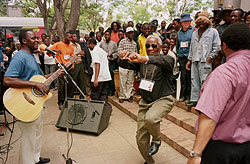* called for a special WCC focus on Africa at the beginning of the 21st century;
* expressed support for WCC member churches in Africa as they work to create a just society, to
"overcome the scourge of HIV/AIDS", and to establish "appropriate ethical values in work,
governance and management";
* urged member churches to work through their governments and United Nations' organizations to
encourage respect for human rights, promotion of an alternative economic order, debt relief,
reductions in the arms trade and peace with justice in the Sudan, the Great Lakes region and other
areas of conflict;
* approved a background paper on Sudan, outlining the history of the present conflict and of WCC
peace initiatives and supporting ongoing peacemaking efforts by the Sudan Ecumenical Forum and
the Inter-Governmental Agency for Development.
The rains came. That made for soggy, muddy pathways through a University of Zimbabwe campus green with growth and splashed with African colours. Rains are so critical in Africa where droughts too often destroy the continent's development. For visitors, the daily deluges and spectacular thunderstorms may have been a nuisance; for Africans they meant life.
Drums throbbed, mbiras hummed and there was a kind of infectious happiness that comes from a spirituality and culture that defy the more cerebral Northern sense of order and logic.

Local sellers soon added their own blend of colour to the campus
Photo by Joan Cambitsis
Mercy Oduyoye of Ghana told about the Creator God of Many Names whom her ancestors knew long before the missionaries came; and Barney Pityana of South Africa said, "We have only known God in the people of our everyday experience... the entire activity of the people, their very being was a devotion to the deity who was the Creator."
The traditional soul of Africa reflects an innate spirituality and holiness.
But also for all to see at this strange assembly in Zimbabwe were Africa's massive contradictions and a sense of near desperation at its marginalization, its horrible wars and epidemics, corruption and desecration of fundamental human rights.


